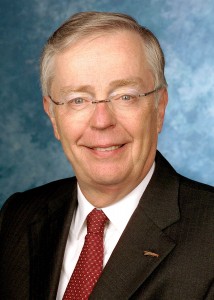
Kent Kresa, GM board member since October of 2003, is experienced with losses. From 2005 to 2009, GM burned more than $40 billion in cash, net worth dropped more than $100 billion.
“The General Motors Board of Directors authorized the filing of a Chapter 11 case with regret that this path proved necessary despite the best efforts of so many. Today marks a new beginning for General Motors. A court-supervised process and transfer of assets will enable a New GM to emerge as a stronger, healthier, more focused and nimbler company with a determination not to just survive but to excel,” said Kent Kresa, the interim chairman, who replaced Rick Wagoner when the Obama administration fired him last month.
“The Board concluded that the proposed transformation will maximize the value of the enterprise, and the return to the many stakeholders who have been involved with GM over the years,” Kresa said this morning.
Whether the board fulfilled its fiduciary responsibility will be part of the legal challenges to its members during bankruptcy hearings by objecting creditors and bondholders, hence the existence of this statement.
“We are appreciative of the support from the U.S. Treasury, the President’s Task Force on Autos, the UAW and its members, salaried employees and retirees, concurring bondholders, and very importantly, the American taxpayers. The Board is confident that this New GM can operate successfully in the intensely competitive U.S. market and around the world. The Board stands behind the people of GM in embracing this unique opportunity to create value and a new company that will design, engineer, build and market the best cars and trucks in world,” said Kresa.
The President, on March 30th, announced that a majority of the directors of New General Motors would be new, so by implication, some existing directors will continue with New GM and some new ones will appear. They will be selected based on consultations between Kresa, his colleagues and the Auto Task Force.
Fritz Henderson’s future?
Senior administration officials were non-committal about GM CEO Fritz Henderson’s future, but said they expected his relationship with the board of directors to continue. Since CEOs serve at the pleasure of the board and a new board is coming, Henderson’s future is unclear. At Chrysler both the Chairman and the CEO are being replaced in the New Chrysler.
A senior administration official said that the kinds of people that are being sought are business leaders, CEOs, former CEOS, people from other walks of life with “relevant experience.”
The senior official pointed to the Chrysler example where the new CEO, Bob Kidder, is a “distinguished former businessman, former CEO of Borden, former CEO of Duracell.” One official claimed that “Kidder’s politics are not known to any of us.”
“I think Bob Kidder exemplifies the type of individual that will be sought to serve on the new General Motors board,” he said. Kidder, of course, has limited automotive experience.
In general terms, a senior official described the government’s philosophy this way: If the U.S. government feels it’s necessary to respond to a company’s request for assistance, “the government has decided to reserve the right to set upfront conditions that will protect taxpayers and promote the financial stability or encourage growth.”
He went on to say that in the GM restructuring and in some other companies, where necessary, these conditions would focus primarily on ensuring a strong board of directors, that focuses on the right kind of management that can deliver a long-term vision, that gets these companies to be profitable, ends the need for government support as quickly as is practical.”
“After those upfront conditions are in place, the government feels that it can protect taxpayers’ investment by managing its ownership stake as hands-off in a commercial manner as possible. And so the government will not interfere with or exert control over day-to-day company operations and very much will ensure that no government employees will serve on board or be employed by the company it makes investments in.”
“As a shareholder, the government will limit what it votes on to core governance issues, particularly the selection of the company’s board of directors; major corporate events or transactions. And in its effort to protect taxpayers’ resources as much as possible, the government intends to be extremely disciplined as to how it uses even these limited rights,” a senior administration official concluded.

Great post! Just wanted to let you know you have a new subscriber- me!